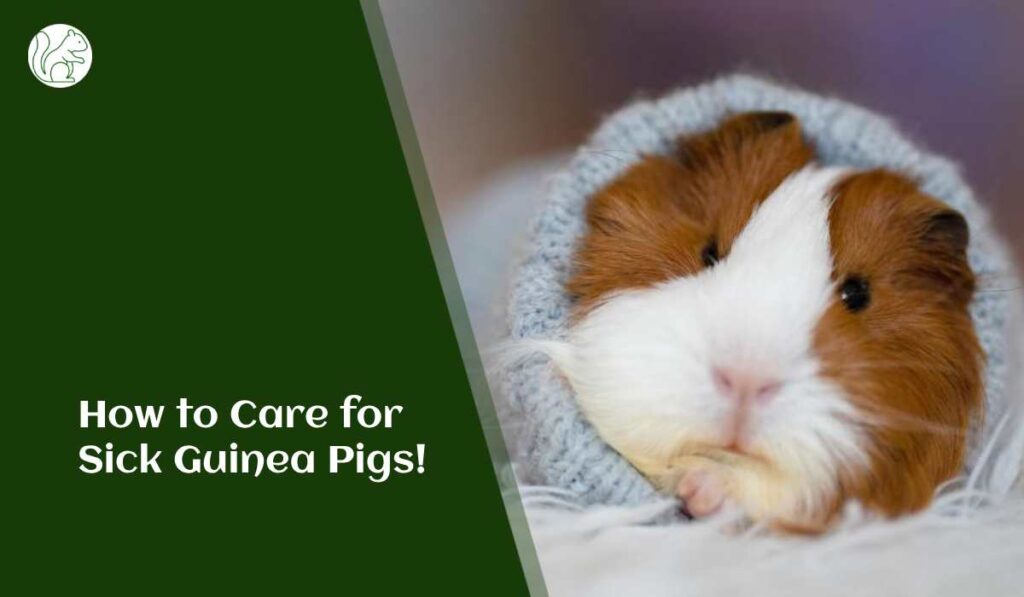Guinea pigs are adorable and gentle creatures that make wonderful pets for people of all ages. However, just like any other living being, they can fall sick from time to time. As a responsible guinea pig owner, it’s essential to know how to care for your furry friend when they are unwell. In this article, we will provide you with valuable insights and practical tips on how to care for sick guinea pigs and ensure their speedy recovery.

Recognizing Signs of Illness
The first step in caring for a sick guinea pig is to recognize the signs of illness. Some common symptoms of a sick guinea pig include:
- Loss of Appetite: A noticeable reduction in food intake or refusal to eat altogether.
- Weight Loss: If you observe that your guinea pig is losing weight rapidly.
- Lethargy: Unusual lack of activity or energy, with your pet appearing weak and tired.
- Breathing Problems: Wheezing, rapid breathing, or labored breathing.
- Discharge: Any unusual discharge from the eyes, nose, or ears.
- Rough Coat: A dull or unkempt appearance of their fur.
Isolate the Sick Guinea Pig
Upon noticing any of these signs, it’s crucial to isolate the sick guinea pig from other healthy pets. This step is essential to prevent the spread of any potential infections and to give your unwell pet a quiet and comfortable space to recover.
Consult a Veterinarian
The next vital step is to consult a veterinarian who is experienced in treating small animals like guinea pigs. A specialized vet can accurately diagnose the illness and recommend appropriate treatment. Never attempt to self-diagnose or administer over-the-counter medications without professional guidance, as it can be harmful to your pet.
Provide Proper Medication
If your veterinarian prescribes medication for your guinea pig, make sure to administer it as instructed. Follow the dosage and schedule carefully to ensure the treatment is effective. It’s also a good idea to keep a record of the medication to track your pet’s progress.

Keep the Environment Clean
Cleanliness is vital to the recovery of your sick guinea pig. Regularly clean their cage, bedding, and surrounding areas. A clean environment will help prevent the spread of germs and create a more conducive space for healing.
Offer Nutritious Food
While your guinea pig is recovering, it’s essential to provide them with a balanced and nutritious diet. Consult your veterinarian to determine the best food options for your pet’s specific condition. Some guinea pigs may require a special diet during their recovery.
Ensure Proper Hydration
Sick guinea pigs are at risk of dehydration, especially if they are not eating as much as usual. Monitor their water intake closely and consider offering water through a syringe if necessary. However, always seek your vet’s advice before attempting this.
Keep an Eye on Body Temperature
Maintaining the right body temperature is crucial for a sick guinea pig’s recovery. Ensure they are kept in a warm and draft-free area, especially if they are exhibiting signs of feeling cold.
Provide Comfort and Company
Guinea pigs are social animals and thrive on companionship. During their illness, spend extra time with them to provide comfort and reassurance. Your presence can have a positive impact on their recovery process.
Monitor Progress and Follow-Up
Regularly monitor your guinea pig’s progress and be vigilant for any changes in their behavior or health. If the initial treatment doesn’t show improvement, don’t hesitate to follow up with your veterinarian for further evaluation and adjustments to the treatment plan.
Conclusion
Caring for a sick guinea pig requires patience, love, and attention. By recognizing the signs of illness early, seeking professional veterinary care, and providing the necessary support, you can help your furry friend recover and return to their cheerful self. Remember, always prioritize the well-being of your pet and take every measure to ensure their health and happiness.
